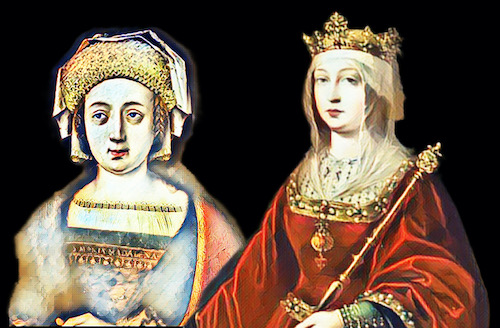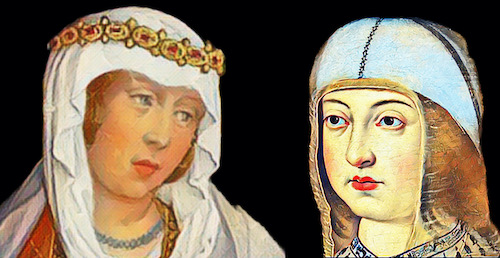George R.R. Martin openly looked to British historical conflicts to imagine his Game of Thrones and House of the Dragon universe, mirroring his protagonists in real figures. Like him, I’m a fan of History and while traveling through Spain I came across the plot of the series Isabel, Queen of Castile, which is in the Globoplay collection, and was a 2020 Spanish production that addresses the War of Castilian Succession. It’s fascinating and a period little explored abroad, but one that would yield more series and films. After all, it features two women on opposite sides in the struggle for Power, one of which is the controversial Isabella of Castile, one of the most powerful monarchs of all time.

The Conflict
The War of the Castilian Succession lasted four years, between 1475 and 1479 and as the name suggests, it was a conflict that arose for the throne of Castile after the death of King Henry IV, in 1474. At the time, the main candidates for the throne were the half -his sister, Isabel I, and his daughter, Juana la Beltraneja. Aunt and niece were not only involved in a dynastic struggle but also a dispute with significant political and international dimensions.
Henry IV was Isabel’s older half-brother, and because he was the first-born male, he was king of Castile before her. Their relationship was complex and often tense. Henry’s reign was marked by political instability, which naturally also generated conflicts over the succession.
Known as Henry the Impotent (in Spanish, Enrique el Impotente), he was the king of Castile and Leon for 20 years, from 1454 until he died in 1474. He was the son of John II of Castile and his first wife, Mary of Castile Aragon, and went down in history as a weak leader, often with questioned authority. One of the most controversial aspects of his reign was the questioning of the legitimacy of his daughter, Joana de Trastâmara, known as Joana la Beltraneja. Many believed that she was the daughter of Beltrán de la Cueva, a court noble, and not Henry IV, which led to succession disputes after Henry’s death. A rumor planted by none other than Isabel herself.

The Civil War
After Henry’s death, the succession to the throne led to the War of Succession of Castile, dividing the supporters of his daughter Joana and those of his half-sister Isabel. Isabel’s claim to the throne was contested by Joana’s supporters, but she was supported by her husband (and cousin). Ferdinand II of Aragon. Isabel considered that the fact that she was the legitimate half-sister of the late king, as well as her marriage to Ferdinand – uniting the crowns of Castile and Aragon, which would later form the basis for the unification of Spain – would make her the natural successor. Joana was supported by her uncle, King Afonso V of Portugal, claiming that she was the legitimate daughter of Henry IV. However, rumors and widespread doubts arose about her paternity, with many believing that she was the daughter of Beltrán de la Cueva, a nobleman, giving her the nickname “la Beltraneja”.
With strong arguments on both sides, the solution was to resort to violence. The war saw several significant battles, including the Battle of Toro in 1476, which was inconclusive but strategically favored Isabella and Ferdinand. The conflict also involved complex alliances. Isabel and Fernando received support from several Castilian nobles and the Kingdom of Aragon, while Joana and Afonso V were supported by Portugal and had some support from France.
The war ended with the Treaty of Alcáçovas in 1479. Under the terms of the treaty, Isabella was recognized as Queen of Castile, while Joana renounced her claim to the throne and retired to a convent. The treaty also had significant colonial implications, as it delineated spheres of influence between Portugal and Castile in the Atlantic, paving the way for future explorations and conflicts over overseas territories. The War of the Castilian Succession was a crucial event in the history of Spain because it not only determined the ruler of Castile but also prepared the ground for the eventual unification of Spain under Isabella and Ferdinand, who are often referred to as the Catholic Monarchs. His reign marked the beginning of Spain’s rise as a great European power and the beginning of its overseas empire.
What about Joana?
Well, Joana la Beltraneja was a controversial historical figure in 15th-century Spain. She was born in 1462 to King Henry IV of Castile and his second wife, Joan of Portugal, but many suspected that her real father was a nobleman from her official father’s court. There is no conclusion about the truth of this rumor, now alleged to have been planted by her enemy, her aunt Isabel.
With the death of Henry IV in 1474, Joan was proclaimed queen by a faction that supported her, but eventually, Isabella won the war. The defeat forced Joana to withdraw from public life and she spent her final years in a convent in Portugal, where she died in 1530. Her story is an example of how questions of legitimacy and succession could lead to significant conflicts in medieval Europe.
A fascinating story, don’t you agree?
Descubra mais sobre
Assine para receber nossas notícias mais recentes por e-mail.
